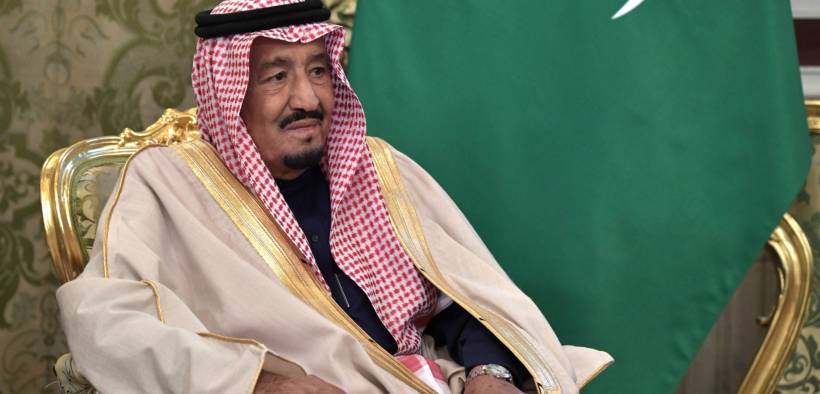Covid-19 Threatens the Future of Saudi Arabia As Over 100 Royals Test Positive

“Most royals are at severe risks of developing complications – poor diet, lack of exercise, age, all those factors play against many members of the monarchy I’m afraid. Evidently daily gatherings, outings and the coming and going of servants is making quarantine a logistical nightmare. The virus could spread at lightning speed unless drastic measures are taken immediately!”
News broke this Thursday that Saudi Arabia’s ruling elite could not, despite their many privileges, escape the reality of the covid-19 pandemic. A month after the Kingdom officially registered its first coronavirus case, Al Saud royals are said to be sitting directly under the virus’ threat.
The Saudi royal family is estimated to have about 15,000 members.
Sources close to the regime have reported that over 100 royals, ranking from junior royals to senior officials tested positive over the past few days, putting the state under the very real threat of a grand institutional vacuum.
Dr Hashem Ahmed, formerly a private physician for some of Al Saud’s extended family warned that the royals’ very lifestyle and their propensity to surround themselves with great many aides and staff put them at a particularly vulnerable position, notwithstanding their general poor health.
He stressed in comments to Citizen Truth: “Most royals are at severe risks of developing complications – poor diet, lack of exercise, age, all those factors play against many members of the monarchy I’m afraid. Evidently daily gatherings, outings and the coming and going of servants is making quarantine a logistical nightmare. The virus could spread at lightning speed unless drastic measures are taken immediately!”
The New York Times put the number at 150. While no official statement has been issued as yet to either refute or confirm the figures, news that both King Salman and his son, Crown Prince Mohammed bin Salman (MbS) both decided to immediately move their quarters to separate remote locations point to the former.
Saudi Prince Faisal bin Bandar bin Abdulaziz Al Saud – the governor of the capital Riyadh who is in his 70s – is in intensive care after contracting the virus, said The New York Times, citing hospital communications, doctors in the country and sources familiar with the family.
With the majority of Saudi Arabia’s inner sanctum well above the age of 60, the virus could decimate Al Saud’s ranks and thus shed a dangerous shadow over its ability to not only lead but inspire enough confidence … or better yet exude enough authority over its people for them to comply by the rule of the monarchy.
Saudi Arabia Health Minister Tawfiq al-Rabiah warned on Tuesday that the worse had yet to come prompting fears of popular unrest. “Within the next few weeks, studies predict the number of infections will range from a minimum of 10,000 to a maximum of 200,000,” he told the official Saudi Press Agency.
Speaking on condition of anonymity a police officer explained how since the outbreak all security and military apparatus had been on a state of high alert. “Since the vast majority of cases have been reported in migrant labour camps and slums around Mecca and Medina, we were told to monitor movements and communications carefully to identify, address and redress dissent.”

Coronavirus Disease 2019 (COVID-19)
While Saudi Arabia remains on all accounts stable and economically sound, at least in comparison to most of its immediate neighbours in the region, the Kingdom’s wealth no longer insulate its rulers from the ever-present possibility of a political downturn – which downturn could be precipitated by the very pandemic which quite literally brought the world to a standstill, and in one smooth sweep of the hand disappeared billions of dollars worth of wealth.
As world nations have yet to tally their losses, few dare entertain the idea of a roaring economic comeback post covid-19. With unemployment and looming fears of a retail ‘apocalypse’ not even the most developed of nations will avoid the bite of 2020 pandemic. It will hurt badly and it will hurt for a while experts have warned.
For many countries economic woes will undoubtedly translate into political instability, even more so in those regions where totalitarianism has been sustained by the unwritten rule that obedience should be rewarded by a certain degree of socio-economic stability. In Saudi Arabia such a trade-off has manifested in state-subsidies, access to government aid programs for the unemployed, start-ups fiscal packages and other financial largesses.
If we consider that the International Monetary Fund back in October 2019 sharply cut Saudi Arabia’s 2019 growth forecast to 0.2% from 1.9%, citing a decline in the kingdom’s oil GDP resulting from the OPEC+ production cuts, it is only reasonable to imagine that the Arab nation will face not a slow-down but a grand economic contraction.
Caught between a mighty oil row, a market downturn, and a pandemic that has yet to be contained – notwithstanding the possibility of institutional bankruptcy Saudi Arabia may not be on such solid ground after all.
With a history going back several centuries the kingdom, or maybe more to the point the House of Saud, faces a crisis which could determine not only its future but that of a region which for decades has fallen and risen on the rhythm of Riyadh’s political wishes and ambitions.
Needless to say that Saudi Arabia’s undoing would dramatically threaten America’s interests in the region … Built around the political and economic constant Al Saud has offered since WW2 the United States’ middle eastern strategy would be rendered null and void should the kingdom falter – a reality heightened by this administration’s flare for political mishaps and diplomatic upsets.
















Very deserving people.